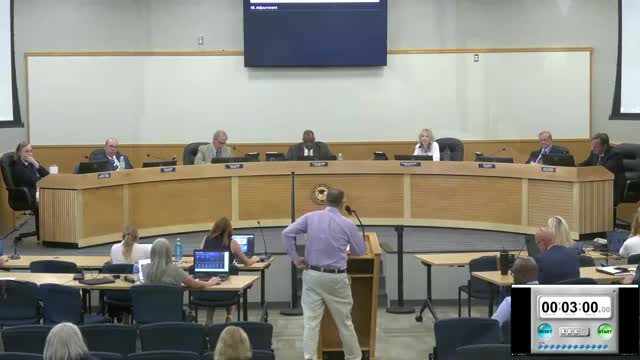Public forum exposes sharp divisions over book review process and library access in Escambia schools
Get AI-powered insights, summaries, and transcripts
Subscribe
Summary
Multiple speakers at the Escambia County School Board public forum debated whether book review committees should include school staff, whether certain titles should be removed from libraries, and whether library materials should be held to the same standards as classroom instruction.
Community members used the board’s public forum to dispute the role and composition of book review committees, argue for and against removal of specific titles and urge clearer standards for library materials.
Why it matters: speakers said committee decisions and library holdings affect what students may read and learn in Escambia County schools, and several called for changes to the review process or for stricter standards that would limit certain books in libraries at different grade levels.
What speakers said
Mickey Price, identifying himself as a member of Marcus Pointe Baptist Church, criticized the presence of school-paid staff on book review committees and called for only community members and parents to serve. “This book is evil,” Price said of a title he is reviewing, urging that borderline books be placed in a restricted area requiring parental opt‑in.
Julie Patton, who spoke with donated time, argued that attempts to ban books have mobilized readers and that the county’s political makeup is changing; she warned that removing books risks excluding groups from public consideration and urged a more inclusive approach.
Linda Fossil defended the committee process, saying she has attended several reviews and found them “courteous, thoughtful, and productive.” She described review committees as a way to ensure decisions are evidence‑based and not driven by partisan agendas.
Rich Holneck urged the board to adopt a legal standard he described as applying the same statutes that govern classroom instruction to library materials. Holneck said that if library material were required to meet the same age‑appropriateness and obscenity standards as classroom materials, it would remove the need for ad hoc committee determinations; he also referenced federal limits on in‑meeting readings on livestreams in a prior case where an attendee was told not to read aloud from a challenged title because of FCC rules.
Discussion vs. claims
Discussion: Several speakers described specific books they find objectionable and pressed for procedural changes to the book review process, including committee composition and access rules. Others defended the committee process and warned against removals that could restrict access to diverse viewpoints.
Decision: The board took no immediate policy vote during public comment on library or book review rules; public comments were recorded for the board’s consideration.
Context and next steps
Speakers repeatedly asked the board to either tighten or preserve current review procedures. The district’s formal book‑challenge process, which includes review committees and later board consideration, remains the operative mechanism; speakers requested changes to committee membership, restricted‑area options for borderline material, and consistent standards applying classroom statutes to library holdings.
Ending: The board did not vote on changes at the meeting; public commenters said they would return if committees did not act in the way they requested.
